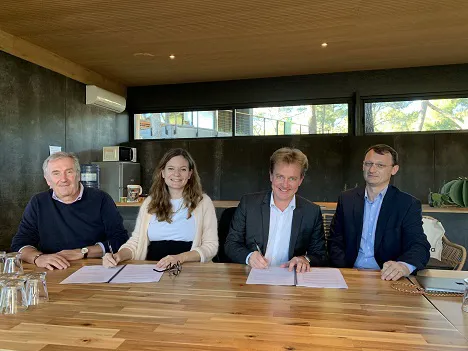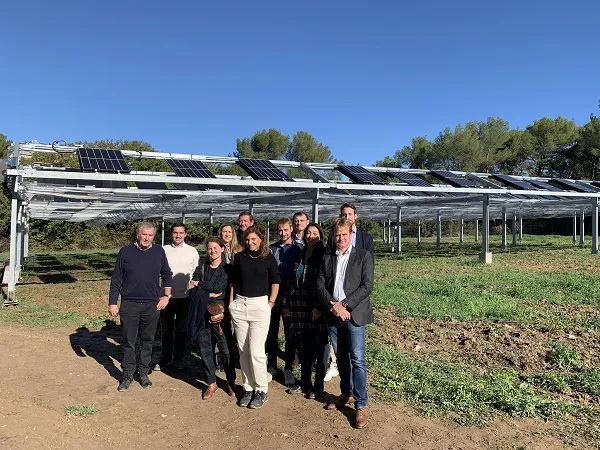Banque des Territoires has signed an innovative and ambitious partnership agreement to develop and finance 350 MW of agrivoltaic projects by 2027, equivalent to the annual consumption of 100,000 households.

The partnership agreement was signed on November 16th 2022 in Aix-en-Provence by Christian Davico, president of Ombrea, Julie Davico-Pahin, CEO of Ombrea, Charles du Dresnay, deputy regional director Provence-Alpes-Côte d’Azur, and Cédric Desmedt, deputy director of the Ecological and Energy Transition Department at Banque des Territoires/ ©Ombrea
As a developer of agrivoltaic projects, Ombrea aims at agricultural performance to support farmers in the face of transition challenges. Its climate protection solutions aim to create an optimal microclimate for the development of plants, even in extreme weather conditions (drought, heatwave, frost, hail...). The start-up develops intelligent systems based on control algorithms that can adapt to all types of crops (arboriculture, viticulture, horticulture, vegetable crops). The objective is to secure the crops and produce solar energy. The climate data collected on the plot helps find a control that is adapted to the crop problems. The innovative solution of Ombrea is installed above the crops. Thanks to an opening and closing mechanism, it can regulate the climate parameters of the plant with dynamic shading. The electricity produced by the panels is sold to the network, which helps cover the cost of the installation. It is important to note that the added value of the technology resides essentially in the collection and processing of the data, as well as in the control of the shades. The joint installation of photovoltaic panels on mobile modules helps finance the installations and gives access to land that is coveted by solar developers.
This equity investment of Banque des Territoires will allow Ombrea, a mid-sized player, to remain independent and anchored in the region, and to support the development of the new agrivoltaic sector. In the short term, this will result in the acquisition and financing of the first 10 agrivoltaic demonstration projects, mainly in the PACA region, covering different crops and climates. Ombrea will then be able to demonstrate the positive impact of its technology on different types of farms. In the medium term, Ombrea aims to scale up to larger sites.

Banque des Territoires’s commitment in favor of more sustainable and connected land is in line with its Climate Plan and its desire to accelerate the energy and ecological transformation. Banque des Territoires currently has a portfolio of direct investments representing an installed capacity of 7.7 GW.
“Agrivoltaics brings an answer to a dual challenge: participating in the development of renewable energies while promoting the resilience of the agricultural world and the performance of farms in the face of climate change, but without reducing agricultural land and without artificializing the soils. Ombrea offers a concrete solution to those 2 particularly critical issues in the PACA region,” explains Cédric Desmedt, deputy director of the Energy and Ecological Transition Department at Banque des Territoires, and Charles du Dresnay, deputy regional director PACA at Banque des Territoires.
“This ambitious agreement shows Ombrea’s approach to territorial development on large-scale agrivoltaic projects. Ombrea is committed to implementing its solutions on an increasingly diversified panel of crops, combining agricultural performance and the production of renewable energy,” explains Julie Davico-Pahin, co-founder and general director of Ombrea. “Faced with the challenges of energy transition and food sovereignty, providing tangible solutions to farmers is an essential challenge in order to adapt to the harmful effects of climate change.”
For more information:
Ombrea
ombrea.fr
